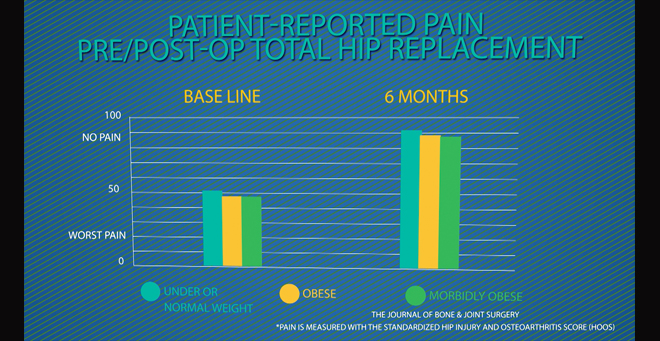 |
|
People who are overweight or obese and undergo total joint replacement experience the same pain relief as those patients who do so at a lower body weight, according to a study by UMass Medical School that is being cited in media outlets across the country.
“The conventional wisdom is that the lower your body weight, the lower your body mass index, the better you will do in joint replacements, and there has been an increasing push to say that if you are obese you should not have joint replacement—either knee or hip replacement,” said study co-author David Ayers, MD, the Arthur M. Pappas, MD, Chair in Orthopedics and chair and professor of orthopedics & physical rehabilitation, in an article by the Worcester Telegram & Gazette that was picked up and published by the Associated Press. “What this study shows is that people who are overweight and are obese get the same type of pain relief and improved function that nonobese patients do.”
Hip and knee replacements represent the highest volume surgery in the United States, according to study co-author Patricia Franklin, MD, MBA, MPH, professor of orthopedics & physical rehabilitation, and principal investigator of the Function and Outcomes Research for Comparative Effectiveness in Total Joint Replacement (FORCE-TJR) program from the federal Agency for Healthcare Research and Quality. Lead author Wenjun Li, PhD, associate professor of medicine and lead author on the study, said the aim of the study, published July 19 in the Journal of Bone and Joint Surgery, was to evaluate the extent of pain relief and functional improvement in total joint replacement patients with various levels of obesity,
The researchers, who also included Jeroan J. Allison, MD, MS, vice chair and professor of quantitative health sciences; and colleagues at Hartford Hospital and Geisinger Health Center, concluded that while obesity is associated with a greater risk of early complications, obesity in itself should not be a deterrent to undergoing total joint replacement to relieve symptoms.
Funded by a $12 million grant, the FORCE-TJR research program has developed a national database of surgical results and patient-reported outcomes from more than 30,000 patients. FORCE-TJR is unique in quantifying patient reported pain and function after surgery in order to assess multiple factors associated with the best results.
Related stories on UMassMedNow:
Study finds obese patients don’t need to lose weight before total joint replacement
UMMS study of patient-reported joint replacement outcomes cited for clinician-engaged learning
New, evidence-based tool to help osteoarthritis patients decide on hip, knee replacement
Enormous shift in payment model for total knee, hip replacement surgery
Boston Globe: UMMS research offers guidance for ideal timing of hip, knee replacements
New medical research targets best time for joint replacement surgery